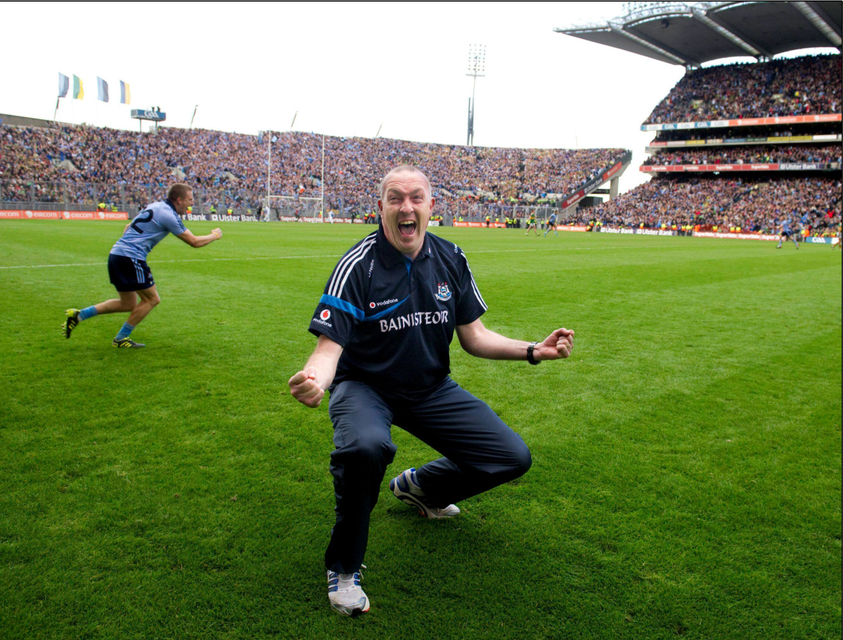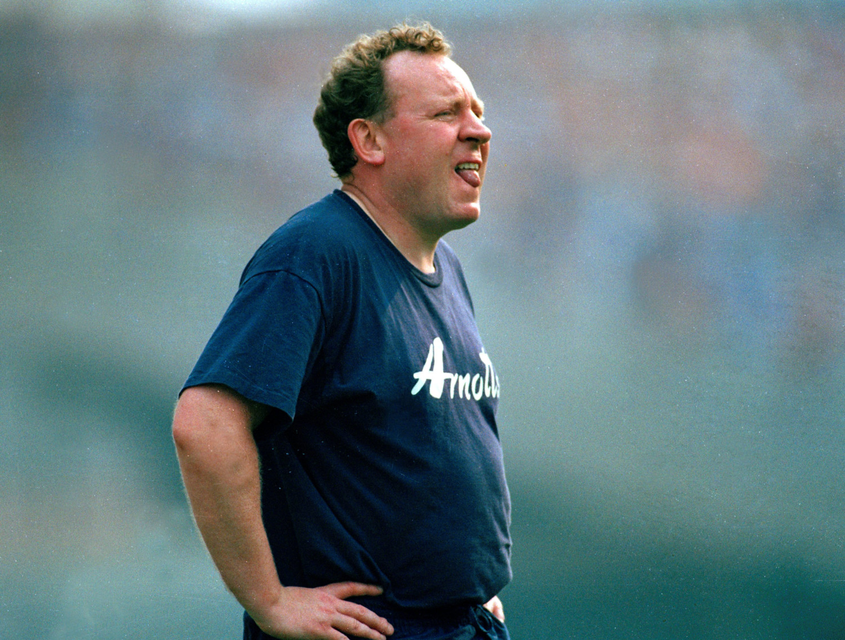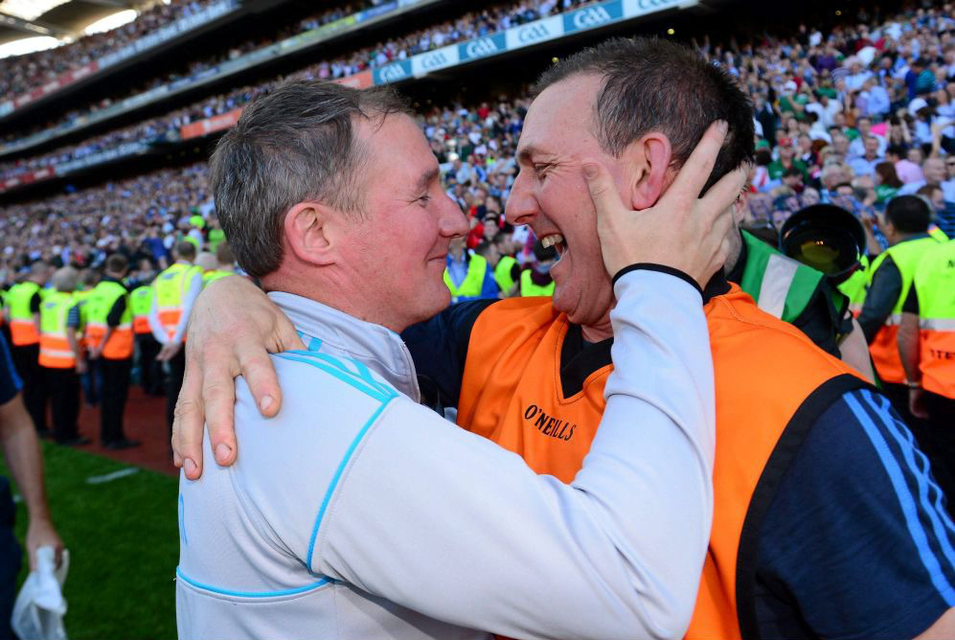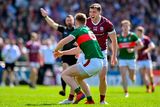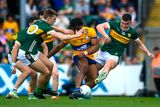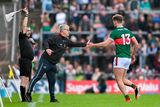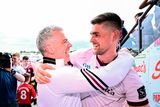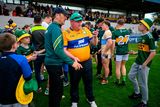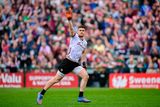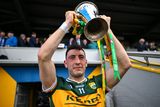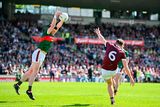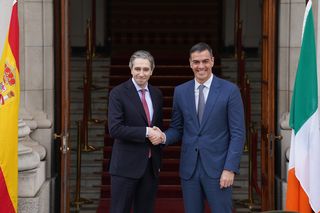Jim Gavin bids to become Dubs’ most successful boss since Kevin Heffernan
Jim Gavin is looking for his second All-Ireland SFC triumph as Dublin manager, something that was achieved by Kevin Heffernan, but not by Pat Gilroy or Pat O’Neill
For a man eternally working a Broadway audience, Jim Gavin remains conspicuous as a leaf in the wind. Who is he exactly? What secrets rest within that small, black book he keeps so close to him like a curate clutching a breviary?
Is a simple raised index finger really his idea of a victory dance? Does he bleed when cut or just leak rivulets of crushed ice?
Gavin is at the helm of the GAA's biggest box-office team, yet he might as well be a rumour to the outside world.
If Dublin win this All-Ireland, he becomes the city's most successful manager since that Woodbine-chewing god, Kevin Heffernan. Now there was a man who understood his stage. Heffo's natural charisma begat the onset of public fascination with managers after a near century of leadership by committee.
And Pat Gilroy, a fellow St Vincents man, would undoubtedly have been helped by Heffernan's imprimatur when appointed to the Dublin job in 2008.
Gavin was an applicant for the job back then too but would have to wait his turn until Gilroy stepped away in 2012, having returned Sam Maguire into Dublin's possession for the first time since 1995 one year earlier.
Kevin Heffernan
Read more:
Read more:
Nothing had to be torn down brick by brick after Gilroy's rein then. Gavin, a key player on that '95 team, just needed to be smart. And that was like asking water to flow downhill.
Smartness is the virtue people associate with his personality as if on reflex. They reference his career in aviation and the diligence that demands as a kind of branding iron for the qualities he brings to management.
Here, after all, is a man who was performing loops and rolls in one of the Air Corps' six Fouga Magisters during his early 20s. Someone who, for a time, was piloting the Government jet.
Gavin's life CV flew so far beyond the fundamentals required for preparing a football team, it almost felt like putting bingo balls in the hands of a Latin scholar.
Pat Gilroy celebrates Dublin's 2011 All-Ireland SFC final win over Kerry
It was Tommy Lyons who first gave him a coaching role, setting himself and Declan Darcy the mission of instilling an ethos of competitive integrity into Dublin's U-21s in 2002.
Both men's county playing careers were tapering to a close, yet Lyons recognised so much in them that he believed Dublin football could ill-afford to lose.
"One of the regrets I had with Dublin was that Gavin and Darcy were the ages they were when I took over," Lyons recalled this week.
"Because I felt there were lots of guys just happy to be members of Dublin panels back then. Winning just didn't seem that important. But these two guys were achievers and I wanted them to send that message to the younger players, that achieving wasn't easy.
"I found Jim a highly intelligent man, very measured, always constructive. He stood out a mile as a leader."
Under that management team, Dublin won the All-Ireland U-21 title in 2003, beating Tyrone in the final. To this day, Lyons references the "calmness" of Gavin when that battle was at its height, an ability to process emotion in a way that would never allow it contaminate sound football judgement.
Lyons says that he "worked very hard" to recruit Gavin as a senior Dublin selector in 2004, but that the Round Towers, Clondalkin clubman was "too busy flying the Taoiseach around the world!"
Recently, Gavin delivered a presentation on leadership to an Army audience in Croke Park. The evening was MC'd by Sean Finnegan, his old Defence Forces football manager. In Finnegan's eight years working an Army dressing-room, Gavin was a constant as his captain.
Why?
He tells a story of a trip to New York in April '99. The invitation came to play two games at Gaelic Park to help the locals prepare for their looming debut in the Connacht Championship.
New York were due to play Mayo some weeks later but, without meaningful games, they could have no real barometer of their standing.
Pat O'Neill
That army team would have been well stocked with inter-county players like Dermot Earley, John Finn, Anthony Rainbow and Fergal Costello. Yet, it was to Gavin they invariably looked to for on-field authority.
"Jimmy Gavin wasn't the world's greatest footballer," reflects Finnegan flatly. "But he was one of those guys you could depend on. He was methodical in his preparation, always up for a game.
"Now, at the end of the day, we weren't playing the All-Ireland or the World Series. Mostly we just played representative games against the guards, the banks, Combined Universities or whatever.
"But, when we went on tours, we had to f***ing win to justify to the (top) brass that this was worthwhile.
"You'd have guys who'd be acting the maggot. But Jim wasn't into that. Now he was no Holy Joe, but he wasn't an all-night slobber. He looked after himself. There was genuine focus on everything he did. He was meticulous about his preparation, his diet and his training. But not in-your-face-stuff. For me, he was a perfect conduit."
Read more:
Read more:
Gavin celebrates the team’s 2013 success with selector Mick Deegan
The first game in Gaelic Park passed by uneventfully, New York beaten comfortably on a Thursday night before a threadbare audience. Gavin, as the Army free-taker, maybe hit them for a dozen points. That seemed to sit uncomfortably in some local stomachs.
By Sunday, the atmosphere in the Bronx had palpably stiffened. A big crowd gathered in expectation of something more rigorous from the exiles. Word was that Mayo's management would be represented in the throng and the New York players, it seemed, felt it timely to deliver a message. So they picked a specific target. And that target was Jim Gavin.
Finnegan remembers: "They had a lot of tough boys, predominantly from Ulster. Boys from Donegal and Tyrone, absolute dogs. And they were trying to send this message back home to Mayo that 'Jesus, these lads are physical brutes!'
"On the tight pitch of Gaelic Park and in front of a baying crowd, they gave Jimmy Gavin an absolutely horrendous time at centre-forward.
"Now Jim was a hard buck, but they targeted him and were really giving it to him. Kevin McStay, a selector with me, said afterwards 'Anyone else would have said 'Look I've enough of this.' They'd lash out.
"But Jimmy just wanted more of the ball. He was all but inviting them on to him. 'C'mon, the more ye hit me, the more I'm going to hurt ya!'
"I'll never forget after the game. He was destroyed. But I never saw a fella being the main man so much, not in a show-off way, as Jimmy was that day."
Why had he been targeted?
"I suppose you tend to target a forward first of all and he was kind of the fulcrum of the whole thing," reflects Finnegan. "The centre-back was a Derry man, a former county player. A fella who was well known as 'The Man', that type of individual. Very early on, he hit Jimmy and it just set the tempo for the whole day.
"The game was turning nasty. In fairness to our lads, who were out really for a jolly and a few pints effectively, they could have just gone through the motions. But when we got into the dressing-room at half-time, Jim was revving them up. 'We'll go back out here now and show them what we're made of!' And I'm telling you, he was black and blue."
The Army won comfortably in the end and, afterwards, Gavin saw to it that there'd be no recriminations.
"It had been a real, nasty atmosphere" recalls Finnegan. "But there was a big barbecue right outside the dressing-rooms after and everyone calmed down. Jim's attitude would be 'Let's go and have a beer with them!'
"There was no tone of 'Let's tear the door down and pull their heads off!' And no disrespect. I think of the likes of (Tommy) Carr and (John) Maughan, they'd actually drill through the wall to go in and kill someone!"
Gavin's management of Dublin has been all of the things the county board would have hoped for it to be. Winning the All-Ireland in 2013 did not lead to any diminishing of personal responsibilities. The steel Gavin showed that April Sunday in New York 16 years ago reflected a self-sufficiency he now seeks in every player.
His team can find expression in the most glorious, eloquent ways, albeit sometimes with a suspicion of the naivety that Donegal exposed last August.
Yet, there is none of that colour in how Gavin himself communicates with the world outside Dublin's dressing-room.
There is a sense that he regards dealing with media as some kind of irksome obligation, an exercise best removed from his schedule early in the day and with minimal engagement.
Few senior GAA correspondents now attend Gavin's morning press conferences, having long since tired of what has come to be regarded as a hopelessly vacuous process.
And Dublin's team announcements have acquired a faintly comedic status given they have yet to start a 15 named.
The sense that Gavin might as well be communicating with them from behind a sheet of Plexiglass has, undeniably, become a source of irritation to journalists. Yet, he makes clear his absolute indifference to that irritation. Dublin succeeding is his singular objective. The rest, he sees as insignificant
Read more
Read more:
A view has formed that his military background has maybe cultivated that cold, clipped persona. That he is most comfortable dictating to people under his command. Carr suspects that people misinterpret him here, however.
Himself a former Dublin player and manager as well as a former Defence Forces playing colleague of Gavin's, Carr reflected this week: "People form this opinion that somebody like me or Jim or John Maughan would be there, barking out orders like drill-sergeants. But, in fact, that's not the Army training. The Army training is to be good at dealing with people, not being autocratic.
"People just have this stereotypical image that is a long way from the truth. Jim gets that label because Army guys are well organised, they are structured, they go through a process in terms of making decisions.
"We call it 'war-gaming' a situation. There's a lot of mirroring of what you do in the Army to what you do on the sports pitch. You're essentially going into confrontation with somebody so you're trying to knock out their what we call 'high ground' in the Army. You're basically analysing the best way to get at them.
"But it's never about dictatorship."
Tomorrow, Gavin brings a Dublin team to Croke Park desperate to avoid the fate that befell them a year ago when most believed the only plausible thing that could stop them successfully defending their All-Ireland was a falling asteroid. And Mayo now are considered a more credible danger than Donegal were then.
Will Gavin's Dublin have the answers?
Carr, pointedly, chooses to reserve judgement. "This year is going to tell a lot about Dublin's set-up and the players that are there" he says. "They got caught last year, they've learnt the hard way.
"But this is Jim's biggest test. Not the first year that he came in. This is it. He has to win. They've had their lesson, have they learnt from it? All of them? Can they now show a level of knowledge and maturity that says they are ready to go all the way?
"Every Dublin team can become flaky from a psychological point of view. I've always said that. I'd call it a degree of immaturity about Dublin teams.
"Whether it's the amount of tension they face or the type of players or their flamboyancy. Often there's not enough substance behind that flamboyancy.
"I'm not sure what it is. . . but we haven't had a Dublin team like the '70s team since the '70s. Last year against Donegal, they totally over-reacted to the setbacks they encountered.
"The first ten minutes of play summed it all up for me. Dublin started showboating. This over-elaboration, an attitude almost of 'Lads we're going to have plenty of this all day, let's enjoy it, let's get some nice, fancy scores. We won't do the bread and butter stuff because we don't need to'.
"Everybody suddenly takes on a different mindset. It becomes 'What the f**k was everybody going on about how difficult it was going to be? That it was going to be impossible to break them down?'
"So this is a pressure year for Jim and that team. In terms of preparation, they have one of the best infrastructures in the country. Now where do you draw the line between a manager being at fault for a team being complacent or arrogant and the players being responsible for themselves?
"If the manager does everything, if he warns ye, tells ye all the dangers, yet still ye go out on the field arrogant or not prepared or flaky, who's to blame?
"My worry is that Dublin haven't won a game of substance in two years. And that makes this game nearly more intriguing than the final, whoever is in it."
After that recent presentation in Croke Park, Finnegan requested the slide-show Gavin had used, only to be rebuffed with a grinning rejection. "Go make it up yourself Sean!" His way of de-mystifying what it was he brought to the evening.
"He was more or less saying 'I ain't no rocket scientist here, there is no golden oracle" chuckles Finnegan now.
"This isn't an ego trip for him. I can honestly say it's never about him and I think people have great respect for that. They see it's not a Jose Mourinho type of thing."
Instead just a man of the skies with his feet planted firmly on the ground.
